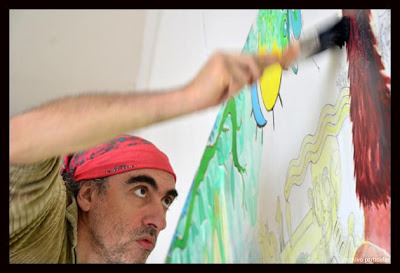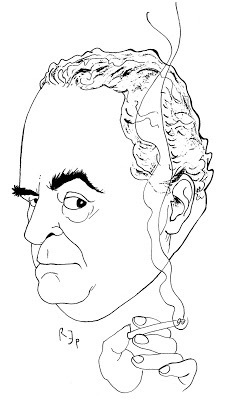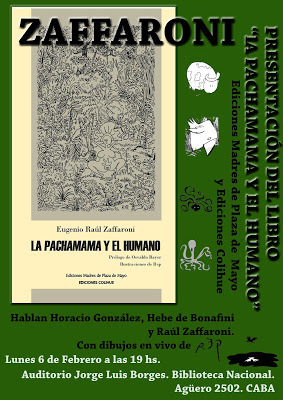Miguel Rep's Blog, page 210
March 3, 2012
MURAL POR LOS DDHH EN UNIVERSITY OF MINNESOTA
Mural por los Derechos Humanos.
Para ver más información entrar a: http://spanport.umn.edu/news/allNews.php?entry=340144
Argentine artist and cartoonist, Miguel Rep, will create a mural depicting the struggles of memory and Human Rights in Argentina in the last decades.
Miguel Rep will be painting the mural on the 4th floor of Folwell Hall between March 1-2. There will be a formal presentation on Saturday March 3rd at 11:00 a.m. on the 4th floor.
In conjunction with
XVII The State of Iberoamerican Studies Series:
Human Rights Across the Disciplines,
March 1-3, 2012.
Para ver más información entrar a: http://spanport.umn.edu/news/allNews.php?entry=340144
Argentine artist and cartoonist, Miguel Rep, will create a mural depicting the struggles of memory and Human Rights in Argentina in the last decades.
Miguel Rep will be painting the mural on the 4th floor of Folwell Hall between March 1-2. There will be a formal presentation on Saturday March 3rd at 11:00 a.m. on the 4th floor.
In conjunction with
XVII The State of Iberoamerican Studies Series:
Human Rights Across the Disciplines,
March 1-3, 2012.
Published on March 03, 2012 07:14
February 21, 2012
LIBRO DE PLAYA
Published on February 21, 2012 10:57
February 3, 2012
NOTA EN EL HERALDO DE COLOMBIA

El humorista gráfico Miguel Rep, en el Carnaval de las Artes
elheraldo.co
La obra de este artista está expuesta en varias estaciones de Transmetro de la ciudad. Parte de su trabajo será expuesto en el foyer del Teatro Amira de la Rosa durante los días del VI Carnaval de las Artes. También hace parte de la exposición itinerante en varias estaciones de Transmetro. Es considerado uno de los más notorios humoristas gráficos de Argentina, aunque a él, Miguel Repiso, no le guste mucho esa clasificación.
Publica tiras diarias en periódicos, crea series temáticas que luego publica, ilustra libros, expone en galerías, pinta murales, hace caricaturas y no presta atención a cuál género pertenece el dibujo que se encuentre realizando. Podríamos llamarle hacedor de imágenes, o comunicador gráfico, pero es mejor que lo llamemos por el nombre con que todos lo reconocen: Rep.
Dibujante, ilustrador y humorista gráfico, Rep comenzó a publicar poco antes de cumplir quince años, en 1976. En su carrera, cuyo aprendizaje autodidacta comenzó atendiendo el kiosco de revistas de su padre, ha publicado hasta el momento más de treinta libros propios y ha ilustrado alrededor de una docena más. Su trabajo ha sido expuesto en países como España y México, y sus dibujos han aparecido en publicaciones como Página 12 y Revista Veintitrés, de Argentina; El País, El Ajo y La Vanguardia, de España; y Playboy México.
Más que caricaturas, su trabajo puede definirse principalmente como apuntes gráficos, pequeñas observaciones que transforman, estilizan y ponen en tela de juicio la realidad. Su obra contiene un universo completo de seres extrañados ante una realidad desacomodada: El soñador Niño Azul, el pesimista Lukas, las atiborradas postales de los barrios de Buenos Aires. De hecho, Quino −de quien, dicho sea de paso, es considerado el sucesor− anunció en algún momento la existencia de un Planeta Rep. www.miguelrep.com.ar - www.miguelrep.blogspot.com
Published on February 03, 2012 21:59
February 2, 2012
PRESENTACIÓN DEL LIBRO DE ZAFFARONI
Published on February 02, 2012 14:55
TIRA
Published on February 02, 2012 14:53
January 31, 2012
CAPUSOTTO Y SABORIDO EN EL HOLOGRAMA Y LA ANCHOA
Si, Diego Capusotto y Pedro Saborido en El Holograma y la Anchoa.
Miércoles 1 de febrero, a las 23 hs.
Así vale la pena, la alegría, empezar el mes.
Por la AM 750 (www.radioam750.com.ar)
Radio Rep
Miércoles 1 de febrero, a las 23 hs.
Así vale la pena, la alegría, empezar el mes.
Por la AM 750 (www.radioam750.com.ar)
Radio Rep
Published on January 31, 2012 14:51
January 30, 2012
January 29, 2012
Artepolis: CUSTODIOS
Published on January 29, 2012 16:51
January 28, 2012
TRIBUTO A GUILLERMO O´DONNELL, POR EL KELLOGG INSTITUTE

Tribute to Guillermo O'Donnell
Our dear friend and colleague Guillermo O'Donnell died yesterday afternoon in his native Buenos Aires at the age of 75, following a four-month battle against cancer.
O'Donnell was a giant in contemporary social science, known around the world for his unique intellectual creativity, his path-breaking originality, and his passion for democracies that function decently. His scholarly work on authoritarianism and democracy established his international reputation as a brilliant and seminal thinker.
Closer to home, he played a pivotal role in creating and developing the Kellogg Institute for International Studies. As Kellogg's first academic director, he defined an exciting research agenda for the Institute and built an outstanding program of visiting fellows. At the time of his death he was professor emeritus of political science at Notre Dame and senior fellow at the Kellogg Institute.
O'Donnell's scholarly contributions can be grouped into three phases. Early in his career, he worked primarily on the origins of authoritarianism in South America, especially in the region's more developed countries. First published in 1973, Modernization and Bureaucratic Authoritarianism was a seminal work in understanding the origins of modern authoritarianism in Latin America.
Unlike many of his contemporaries, Guillermo recognized that this was a new kind of authoritarian rule. Again unlike his contemporaries, he also understood that this new pattern of authoritarian rule had profound theoretical implications for understanding the relationship between modernization and democracy. He subsequently wrote many important papers about the nature of authoritarianism in Latin America.
In a second phase, O'Donnell was the pioneer in anticipating the wave of transitions to democracy that began in Latin America in 1978. With remarkable prescience, when Latin America was at the zenith of authoritarian rule, he correctly and almost uniquely understood that many of the awful dictatorships then in power were likely to be transient. He studied internal contradictions within authoritarian regimes and then analyzed the wave of transitions to democracy that resulted in part from the tensions within authoritarianism that he had analyzed earlier. Once again, he opened a new research question, hugely important both theoretically and in the "real" world. His 1986 co-edited volume, Transitions From Authoritarian Rule (Johns Hopkins University Press) remains a classic. It is one of the most widely cited works in political science.
Beginning in the late 1980s, O'Donnell's attention turned to the severe deficiencies of most democratic regimes, again with a primary focus on Latin America. While countless other individuals observed these same deficiencies, nobody matched his acuity in the theoretical analysis of new issues that revolve around these shortcomings. He coined many important concepts that remain at the core of analyses of contemporary democracy. For example, his concept "delegative democracy" refers to democratic regimes in which the president and congress are democratically elected, but in which mechanisms of accountability are fragile. He contributed seminal articles on accountability, the rule of law, and the relationship between the state and democracy. His article, "Democracy, Law and Comparative Politics" (Studies in Comparative International Development, Spring 2001), won the Luebbert Prize for the best article in comparative politics, awarded annually by the Comparative Politics section of the American Political Science Association.
As a scholar, O'Donnell always focused on great normative issues that confront contemporary humanity—how to build better democracies, how to ensure more effective rule of law and more even citizenship. In the last two decades, he achieved a judicious balance between criticizing the deficiencies of Latin American democracies while at the same time not indulging in facile criticisms that could fuel anti-democratic sentiment.
His scholarship won him wide recognition. A member of the American Academy of Arts and Sciences, O'Donnell won the 2003 Kalman Silvert Award for Lifetime Achievement, given every 18 months by the Latin American Studies Association. He was president of the International Political Science Association from 1988 to 1991, and also served as vice-president of the American Political Science Association from 1999 to 2000. In 2006, he won the inaugural Lifetime Achievement Award of the International Political Science Association. He was the recipient of countless other fellowships and awards, including the John Simon Guggenheim Memorial Foundation Fellowship.
Indicative of the nearly global reach of O'Donnell's work, it has been translated into Korean, Japanese, Portuguese, Chinese, and of course, English. In recent years, several leading Latin American universities awarded him honorary PhDs.
Throughout his career, O'Donnell posed great new theoretical questions about tremendously important developments in the contemporary world. He was a deeply learned person who always drew upon the antecedent scholarship, yet one of his extraordinary gifts was recognizing new questions and new problems that had not hitherto been addressed. He stands as one of the most important thinkers about democracy and dictatorships in the history of political science.
Scott Mainwaring
Director, Kellogg Institute for International Studies
Eugene and Helen Conley Professor of Political Science
University of Notre Dame
November 30, 2011
Read Abe Lowenthal's tribute here.
Read CIEPLAN's tribute here (en enspañol).
Read the Espacios Políticas tribute edition here (en enspañol).
Guillermo O'Donnell: Recuento de Notre Dame
Claudia Maldonado Trujillo
Published on January 28, 2012 10:41
Miguel Rep's Blog
- Miguel Rep's profile
- 12 followers
Miguel Rep isn't a Goodreads Author
(yet),
but they
do have a blog,
so here are some recent posts imported from
their feed.












